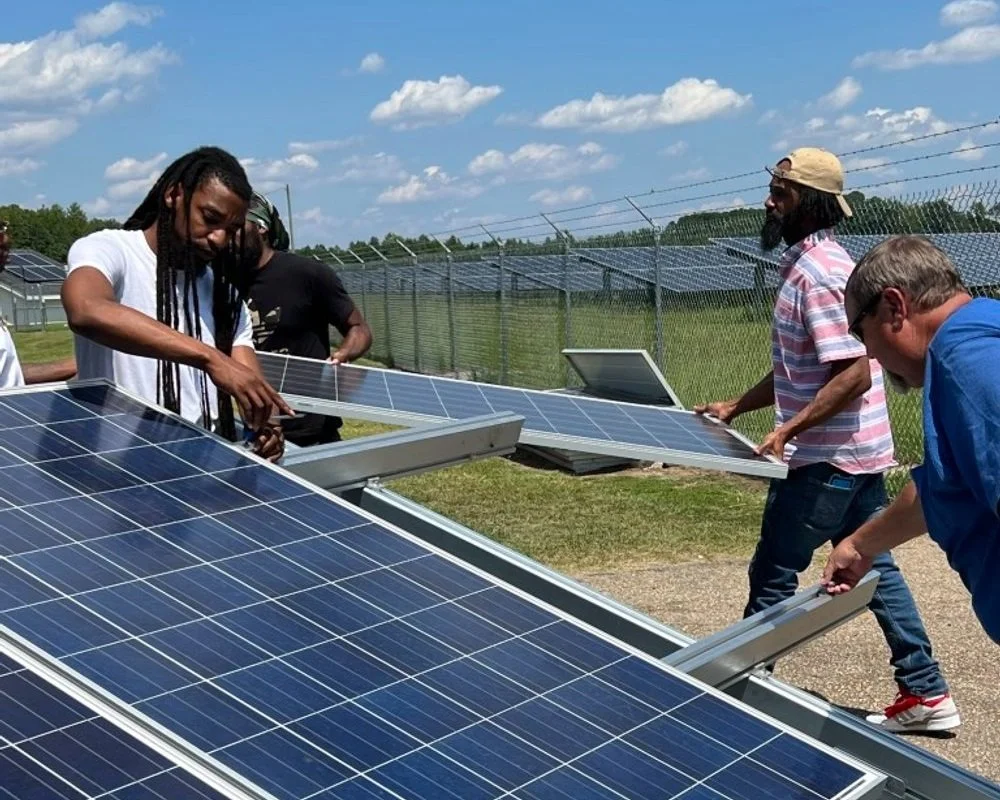Anchoring a Rural Energy Transformation
This article was written as part of our 2023 Impact Report.
When Patrice Jordan* first brought up EV school buses to the fleet managers at the local school districts here in northeastern North Carolina, they weren’t really interested. Jordan was the public relations and engagement coordinator for Roanoke Cooperative, a rural electric cooperative (REC) that serves a rural, five-county region that is among the most economically distressed in the state. She knew there were millions of dollars coming available for both busses and charging infrastructure through the Environmental Protection Agency’s Clean School Bus Program, funded by the Bipartisan Infrastructure Law, and the state’s allocation from the Volkswagen settlement, and wanted to make sure schools in her region could take advantage of it.
“They had not heard about it before, and at first they didn’t take to it,” she explained. “But the superintendent got with them and let them know, ‘these are free buses. Bringing them into the area is a great opportunity.’”
Roanoke Cooperative President and CEO Marshall Cherry in front of a solar array at their headquarters that’s used to offset the cost of home repairs and energy efficiency upgrades for some of their highest energy burden member-owners. Photo by Cornell Watson.
Looking for opportunities like this to support a transition to cleaner, renewable energy in ways that benefit their largely Black member owners (rural electric cooperative customers are also considered owners with voting rights) is one of the top priorities for Roanoke Cooperative and its nonprofit arm, The Roanoke Center, a Hive Fund grantee partner. The cooperative has emerged as a regional leader in strategies to reduce energy use and maintain a healthy grid while lowering consumer costs, demonstrating that with philanthropic support to innovate, pilot, and scale, RECs can serve as anchors for energy transformation in rural areas.
“Rural electrical co-ops serve more than 90 percent of the counties recognized for persistent poverty and many of the most energy burdened communities,” said Tamara Jones, Co-Executive Director of Clean Energy Works, a national group working to advance utility investments in renewable energy and energy efficiency. “They are key sites for showing that energy democracies can produce faster and more just energy transitions.”
powering multiple bottom lines
Roanoke Cooperative teamed up with Clean Energy Works (also a Hive Fund grantee partner) and several other partners in 2021 to test out the benefits of bidirectional charging with household electric vehicles, where the vehicle batteries serve as a sort of energy bank for the utility to draw from during periods of high demand. What they found was that EVs didn’t just reduce fuel costs for consumers; they also saved the utility as much as $3200 a year per charger in peak energy costs.
A Roanoke member owner and EV owner helps celebrate the installation of the first public EV charging station in Gates County. Photo courtesy of Roanoke Cooperative.
Based on these findings, Roanoke decided to pursue electric school buses combined with solar power as part of its broader strategy to increase grid stability and keep costs low for its member owners — they haven’t raised rates since 2018 and are hoping to keep them steady through 2027. Patrice Jordan was tasked with doing outreach to districts, and Roanoke supported them with their applications. Of sixteen applied for, five buses in two districts have been awarded so far.
“This really helps us push off a rate increase,” said Cathy Davison, Roanoke’s Chief Financial Officer “Purchasing power at peak can be 20-30 percent more expensive than normal, and it’s hard to forecast for that expense. You can also align the buses so they can also be discharged to power the school system, and that saves the school system money.”
creating broader economic opportunity
C4EE solar installation training. Photo courtesy of C4EE.
Though small, these first projects will have ripple effects throughout the region. The solar installations are being put out to bid to local developers, who will hire local workers, and the buses will need trained technicians to service them.
“Some schools are hesitant to get involved with electric buses because of concerns about charging, maintenance, and upkeep,” said Mozine Lowe, Executive Director of Center for Energy Education (C4EE), a Hive Fund grantee partner that provides training and education around renewable energy. “With battery storage, EVs, energy efficiency, microgrids, and solar coming in, we need to have skilled people in the region that can fill these positions. We’re exploring the feasibility of adding training around electric school bus charging into our mix.”
leveraging funding opportunities
With so much funding coming online through the Inflation Reduction Act and the Infrastructure Investment and Jobs Act, including $11 billion from the USDA for rural electrification, there will be tremendous opportunities for RECs like Roanoke to both upgrade their grids and pursue innovative clean energy and demand reduction projects that have economic and resilience benefits for their communities. Other projects Roanoke is pursuing include upgrading transmission lines to improve stability and increase capacity for renewables; solar plus storage installations on land owned by Black farmers, who are often overlooked by solar developers; and microgrids. The utility also offers a program that provides home repairs and energy efficiency upgrades that are paid for over time by savings on home energy bills.
There are over 800 rural electric cooperatives in the US, serving 18 million households. How they choose to engage with these new funding opportunities will be critical to the success of a national energy transition. Leaders like Roanoke Cooperative are showing how renewable energy projects, grid innovations, and equity-centered consumer programs can reduce our reliance on dirty energy and support their multiple bottom lines. Philanthropy can play an important role in helping them test out ideas, share learnings, and scale new finance and project models within and across territories.
*We honor the passing of Patrice Jordan during the writing of this article. She was a passionate champion for Roanoke’s members during her 22-year career there, and worked to ensure the cooperative’s offerings met their needs.



